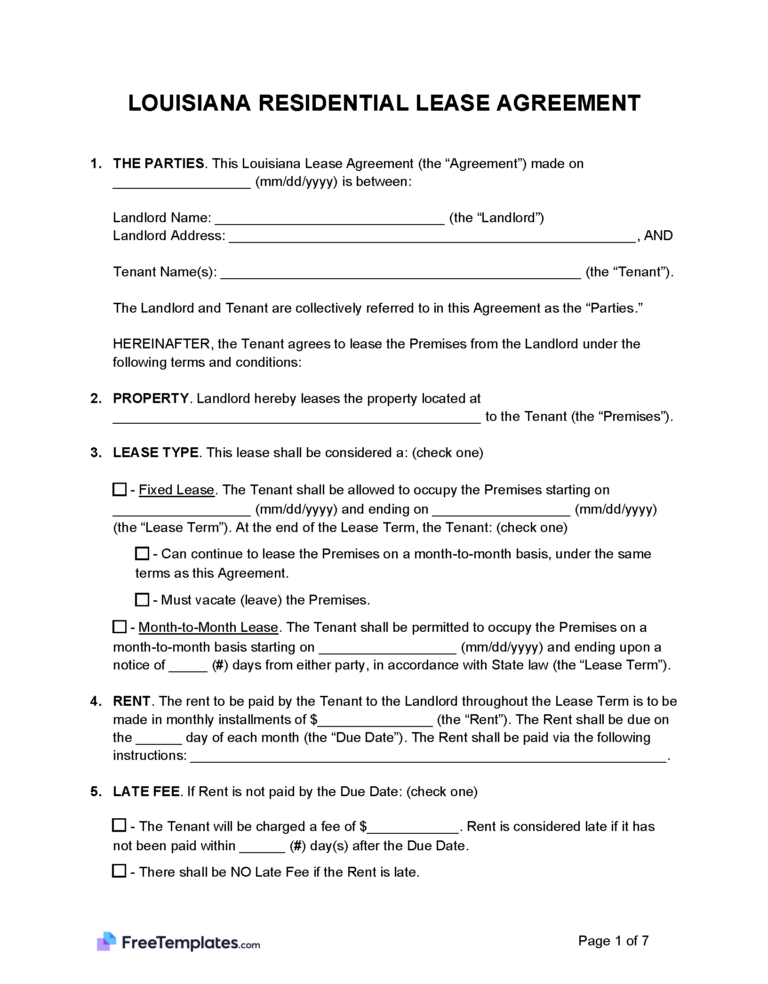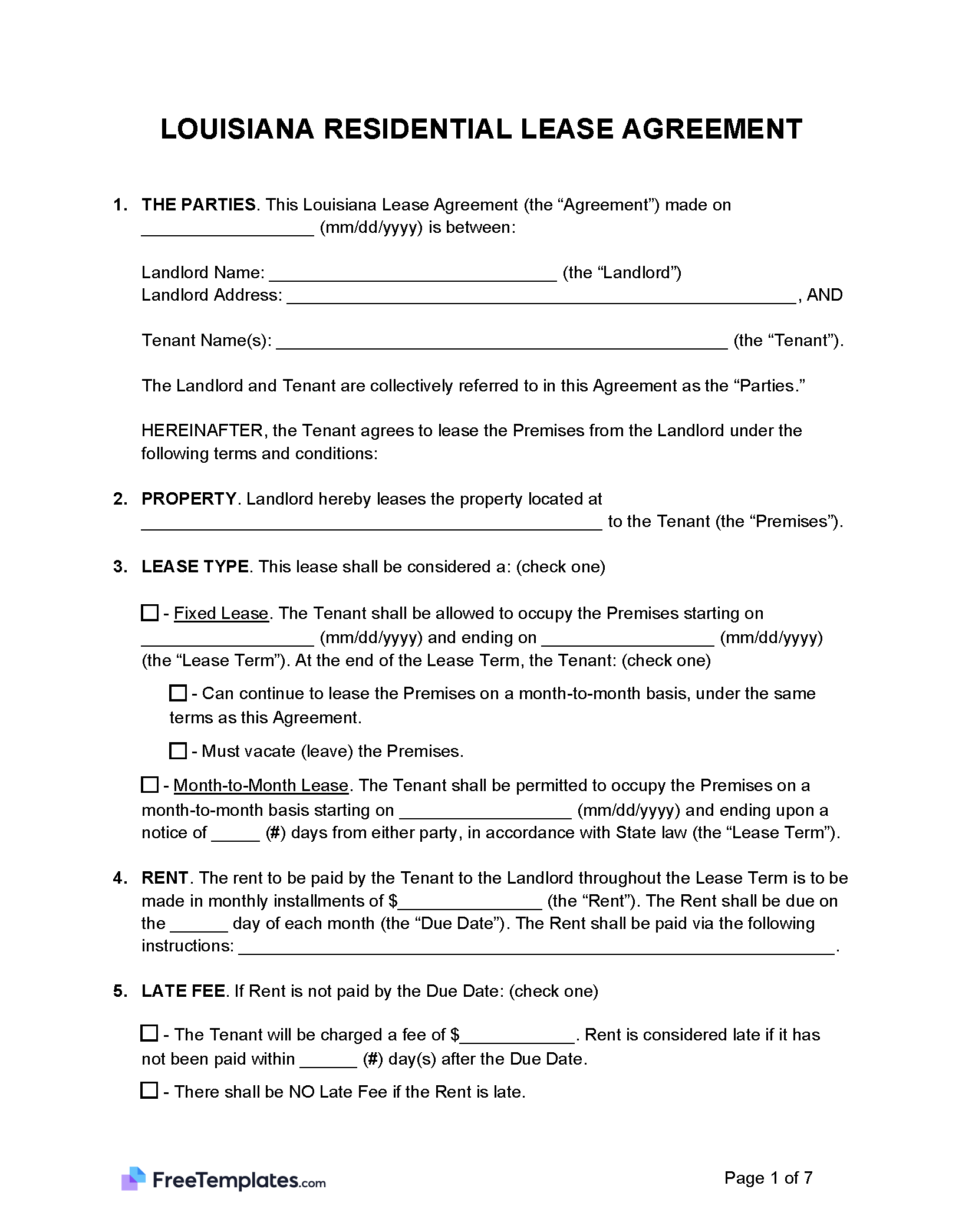By Type (6)
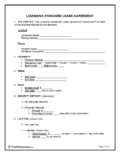 Standard Lease Agree ment – Signed by the lessee and the lessor, the rental contract outlines the terms and conditions for a fixed period, typically one year. Standard Lease Agree ment – Signed by the lessee and the lessor, the rental contract outlines the terms and conditions for a fixed period, typically one year. Download: PDF, MS Word, ODT |
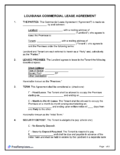 Commercial Lease Agreement – This arrangement outlines the terms and regulations for renting a property, and a business entity and a landlord agree upon it. Commercial Lease Agreement – This arrangement outlines the terms and regulations for renting a property, and a business entity and a landlord agree upon it.Download: PDF, MS Word, ODT |
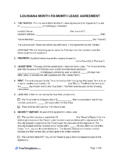 Month-to-Month Lease Agreement – a 30-day contract that renews monthly without a fixed end date or with 30-day notice from either the renter or the landlord. Month-to-Month Lease Agreement – a 30-day contract that renews monthly without a fixed end date or with 30-day notice from either the renter or the landlord.Download: PDF, MS Word, ODT |
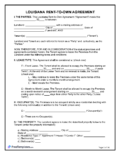 Rent-to-Own Agreement – In addition to the terms outlined in the Standard Lease Agreement, it includes details and conditions on how the renter can purchase the property from the owner. Rent-to-Own Agreement – In addition to the terms outlined in the Standard Lease Agreement, it includes details and conditions on how the renter can purchase the property from the owner.Download: PDF, MS Word, ODT |
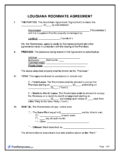 Roommate Agreement – A formal document between 2 or more individuals sharing a residence that outlines the expectations of living together. Roommate Agreement – A formal document between 2 or more individuals sharing a residence that outlines the expectations of living together.Download: PDF, MS Word, ODT |
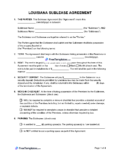 Sublease Agreement – The initial tenant, sublessor, rents out all or part of their rental unit to a new tenant, the sublessee. The sublessor remains legally bound by the conditions set forth by the landlord. Sublease Agreement – The initial tenant, sublessor, rents out all or part of their rental unit to a new tenant, the sublessee. The sublessor remains legally bound by the conditions set forth by the landlord.Download: PDF, MS Word, ODT |
Disclosures (1)
Lead-Based Paint Disclosure – For properties built before January 1, 1978, renters must receive a pamphlet on the dangers and how to identify lead-based paint, any known information concerning the presence of lead-based paint hazards, and this attachment to the lease agreement.
Security Deposit
Maximum Amount – Louisiana is considered a landlord-friendly state and does not govern the maximum amount a landlord can charge the tenant as a security deposit.
Collecting Interest – Landlords are not mandated to collect interest on the tenant’s security deposit while they hold the funds.
Returning to Tenant – The landlord has 1 month from the end of the lease term to return the security deposit to the tenant, minus any funds withheld for damages or unpaid rent.
- Itemized List Required? Deductions must be itemized in a list with a statement explaining the reasons within 30 days. (RS 9:3251(A))
- Failure to do so will result in a $300 fine or twice the amount of the deposit, whichever is greater. (RS 9:3252(A))
Landlord Access
Emergency Access – The landlord can enter the rental premises at any time.
General Access – The landlord can lawfully enter the property without notice. However, it is recommended that they give at least 24-hour notice out of respect for the tenant and their privacy.
Paying Rent
Grace Period – If rent is not paid on the date disclosed on the lease agreement, the landlord can begin the eviction process with a 5-day notice. No state-mandated grace period exists in Louisiana unless otherwise disclosed in the contract.
Maximum Late Fee – A Louisiana landlord can charge a late fee for delayed rent payments as much as he or she wants. However, this fee must be detailed in the lease.
Returned Checks (NSF) – For a bounced check or dishonored payment method, the landlord in Louisiana can charge $25 or 5% of the payment amount, whichever is greater. (RS 9:2782(B))
Reasons for Eviction (3)
Non-Payment of Rent – The lessor can serve the tenant with a 5-day notice if the lessee does not pay rent. This gives the tenant 5 business days to move out of the rental unit, excluding holidays. (CCP 4701)
Non-Compliance – If the lessee violates a term of the rental contract, the landlord can give the tenant a 5-day notice to vacate the rental unit. This timeframe excludes holidays and weekends. (CCP 4701)
Lease Termination – The landlord can issue a 5-day notice if the tenant remains in the property after the lease ends. If the lease has no expiration date, the landlord can serve a 30-day notice to leave the premises. (CCP 4701)
